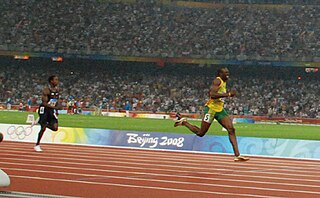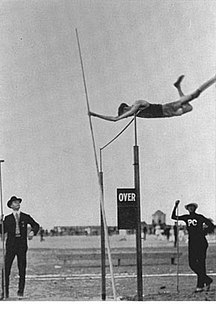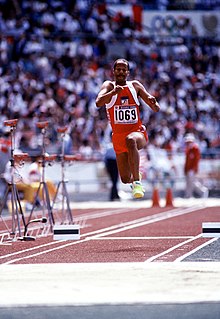
The 1900 Summer Olympics, today officially known as the Games of the II Olympiad, was an international multi-sport event that took place in Paris, France, in 1900. No opening or closing ceremonies were held; competitions began on 14 May and ended on 28 October.

Athletics has been contested at every Summer Olympics since the birth of the modern Olympic movement at the 1896 Summer Olympics. The athletics program traces its earliest roots to events used in the ancient Greek Olympics. The modern program includes track and field events, road running events, and racewalking events. Cross country running was also on the program in earlier editions but it was dropped after the 1924 Summer Olympics.

The all-time medal table for all Olympic Games from 1896 to 2018, including Summer Olympic Games, Winter Olympic Games, and a combined total of both, is tabulated below. These Olympic medal counts do not include the 1906 Intercalated Games which are no longer recognized by the International Olympic Committee (IOC) as official Games. The IOC itself does not publish all-time tables, and publishes unofficial tables only per single Games. This table was thus compiled by adding up single entries from the IOC database.

Sailing has been one of the Olympic sports since the Games of the I Olympiad, held in Athens, Greece, in 1896. Despite being scheduled in the first Olympic program, the races were canceled due to severe weather conditions. Apart from the 1904 Summer Olympics, sailing has been present in every edition of the Olympic Games.

George Edward Larner was an English athlete who competed mainly in the 10-mile walk. He was a multi-time Amateur Athletic Association of England champion, and won two gold medals at the 1908 Summer Olympics in London.

The 100 metres at the Summer Olympics has been contested since the first edition of the multi-sport event. The men's 100 m has been present on the Olympic athletics programme since 1896. The 100 metres is considered one of the blue ribbon events of the Olympics and is among the highest profile competitions at the games. It is the most prestigious 100 m race at elite level and is the shortest sprinting competition at the Olympics – a position it has held at every edition except for a brief period between 1900 and 1904, when a men's 60 metres was contested.

The 200 metres at the Summer Olympics has been contested since the second edition of the multi-sport event. The men's 200 m has been present on the Olympic athletics programme since 1900 and the women's 200 m has been held continuously since its introduction at the 1948 Games. It is the most prestigious 200 m race at elite level. The competition format typically has three or four qualifying rounds leading to a final race between eight athletes.

The 400 metres at the Summer Olympics has been contested since the first edition of the multi-sport event. The men's 400 m has been present on the Olympic athletics programme since 1896 but nearly seventy years passed before the introduction of the women's 400 m, which has been held continuously since the 1964 Games. It is the most prestigious 400 m race at elite level. The competition format typically has two qualifying rounds leading to a final race between eight athletes.

The 800 metres at the Summer Olympics has been contested since the first edition of the multi-sport event. The men's 800 m has been present on the Olympic athletics programme since 1896. The women's event was first held in 1928, making it the first distance running event for women. However it was not held again until 1960, since when it has been a permanent fixture. It is the most prestigious 800 m race at elite level. The competition format typically has three rounds: a qualifying round, semi-final stage, and a final between eight runners.

The 1500 metres at the Summer Olympics has been contested since the first edition of the multi-sport event. The men's 1500 m has been present on the Olympic athletics programme since 1896. The women's event was not introduced until over seventy years later, but it has been a permanent fixture since it was first held in 1972. It is the most prestigious 1500 m race at elite level. The competition format comprises three rounds: a heats stage, semi-finals, then a final typically between twelve athletes.

The 4×400 metres relay at the Summer Olympics is the longest track relay event held at the multi-sport event. The men's relay has been present on the Olympic athletics programme since 1912 and the women's event has been continuously held since the 1972 Olympics. It is the most prestigious 4×400 m relay race at elite level. At the 1908 Summer Olympics, a precursor to this event was held – the 1600 m medley relay. This event, with two legs of 200 m, one of 400 m, and a final leg of 800 m, was the first track relay in Olympic history.

The sprint hurdles at the Summer Olympics have been contested over a variety of distances at the multi-sport event. The men's 110 metres hurdles has been present on the Olympic athletics programme since the first edition in 1896. A men's 200 metres hurdles was also briefly held, from 1900 to 1904. The first women's sprint hurdling event was added to the programme at the 1932 Olympics in the form of the 80 metres hurdles. At the 1972 Games the women's distance was extended to the 100 metres hurdles, which is the current international standard.

The steeplechase at the Summer Olympics has been held over several distances and is the longest track event with obstacles held at the multi-sport event. The men's 3000 metres steeplechase has been present on the Olympic athletics programme since 1920. The women's event is the most recent addition to the programme, having been added at the 2008 Olympics. It is the most prestigious steeplechase track race at elite level.

The 60 metres at the Summer Olympics was contested at the multi-sport event in 1900 and 1904. Part of the Olympic athletics programme, it is the shortest sprinting event to have featured at the Olympics. The shortest sprinting event on the current programme is the 100 metres. Only men competed in the two years that the event was held.

The discus throw at the Summer Olympics is one of four track and field throwing events held at the multi-sport event. The men's discus throw has been present on the Olympic athletics programme since 1896. The women's event was first contested at the 1928 Olympics, being one of the five athletics events in the inaugural Olympic women's programme.

The hammer throw at the Summer Olympics is one of four track and field throwing events held at the multi-sport event. The men's hammer throw has been present on the Olympic athletics programme since 1900, becoming the third Olympic throws event after the shot put and discus throw. The women's event was a much later addition, being first contested at the 2000 Olympics.

The pole vault at the Summer Olympics is grouped among the four track and field jumping events held at the multi-sport event. The men's pole vault has been present on the Olympic athletics programme since the first Summer Olympics in 1896. The women's event is one of the latest additions to the programme, first being contested at the 2000 Summer Olympics – along with the addition of the hammer throw, this brought the women's field event programme to parity with the men's.

The high jump at the Summer Olympics is grouped among the four track and field jumping events held at the multi-sport event. The men's high jump has been present on the Olympic athletics programme since the first Summer Olympics in 1896. The women's high jump was one of five events to feature on the first women's athletics programme in 1928, and it was the only jumping event available to women until 1948, when the long jump was permitted.

The long jump at the Summer Olympics is grouped among the four track and field jumping events held at the multi-sport event. The men's long jump has been present on the Olympic athletics programme since the first Summer Olympics in 1896. The women's long jump was introduced over fifty years later in 1948 and was the second Olympic jumping event for women after the high jump, which was added in 1928.

The triple jump at the Summer Olympics is grouped among the four track and field jumping events held at the multi-sport event. The men's triple jump has been present on the Olympic athletics programme since the first Summer Olympics in 1896. The women's triple jump is one of the more recent additions to the programme, having been first contested in 1996. It became the third Olympic jumping event for women after the high jump and long jump.




















